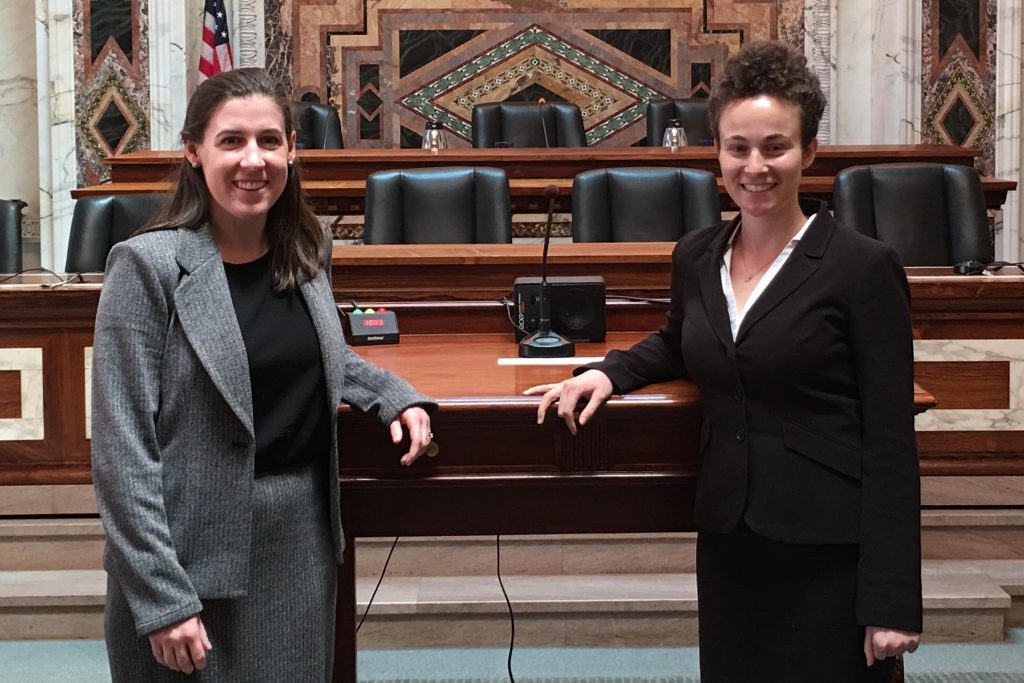Mary Pat Brogan ’16 and Shayna Sehayik ’16 (above, left to right) prevailed in the case that they represented before the Ninth Circuit Court of Appeals this past spring. The victory means that BC Law’s Ninth Circuit Court Appellate Program, a clinic founded and directed by Professor Kari Hong, is two for two this year, both cases having resulted in positive outcomes. Since its inception three years ago, the Ninth Circuit clinic has won five of six cases and produced two published decisions.
The Ninth Circuit Court of Appeals permits law students to prepare briefs and argue a case to the panel of federal judges. In Brogan and Sehayik’s case, Santos Sandoval v. Loretta E. Lynch, Sandoval was seeking asylum, withholding, and protection under the Convention Against Torture after MS-13 gang members killed his father, extorted equipment and money, and threatened him with death.
Sandoval fled his country, and after living in the United States for 10 years, was detained by ICE. From detention, he represented himself in a hearing before an immigration judge and on appeal before the Board of Immigration Appeals (BIA). The judge denied his claims and ordered him removed, finding him not credible based on testimonial inconsistencies.
The judge also denied his claim because he had been convicted of a domestic violence offense under California law. The California criminal court judge did not impose prison time and instead granted probation. In addition, Sandoval expunged the conviction, which erased it under state law. Immigration law nonetheless considered this crime to be serious enough to prevent him from receiving remedies.
Before the Ninth Circuit, Brogan and Sehayik prepared a lengthy brief raising multiple challenges to his removal order. The students brought up novel issues contesting the adverse credibility finding, presenting a due process argument arising from Sandoval’s limitation in gathering witnesses and evidence while representing himself in detention. They also contended that recent Supreme Court precedent renders the California domestic violence offense not a crime involving moral turpitude.
The Court disagreed on the first two claims but agreed with the third. The Court remanded the case to the BIA to address for the first time whether in fact the state court offense is a crime involving moral turpitude. In the meantime, Sandoval was able to post a bond and was released from immigration detention. BC Law’s program will continue to represent him on remand.
“I could not be more proud of how Mary Pat and Shayna represented their client,” said Professor Hong. “They both worked incredibly hard on the brief and gave our client an amazing defense. At oral argument, Mary Pat was unflappable. She was able to answer every single question that was asked by the judges and showed poise, good judgment, and excellent advocacy. These two new graduates are going to be phenomenal advocates in their careers.”
Sehayik is now working at the Esperanza Immigrant Rights Project with the Catholic Charities of Los Angeles. Brogan is working at the New York City Legal Aid Society and the following year will be clerking for Judge D. Michael Fisher at the Third Circuit Court of Appeals.
View the video of their arguments here, the Sandoval Decision 2016, and about earlier victories here, here, and here.
The BC Ninth Circuit Appellate Program provides pro bono representation to non-citizens with criminal convictions. A central criticism of immigration law is that it treats hundreds of crimes the same, failing to take into account that state and federal judges consider specific offenses not serious or deserving of probation instead of incarceration. The clinic’s mission is to use federal court advocacy to restore proportionality and common sense into the immigration consequences of criminal convictions.


